2023届高考英语宾语从句的讲解与运用课件(49张PPT)
文档属性
| 名称 | 2023届高考英语宾语从句的讲解与运用课件(49张PPT) | 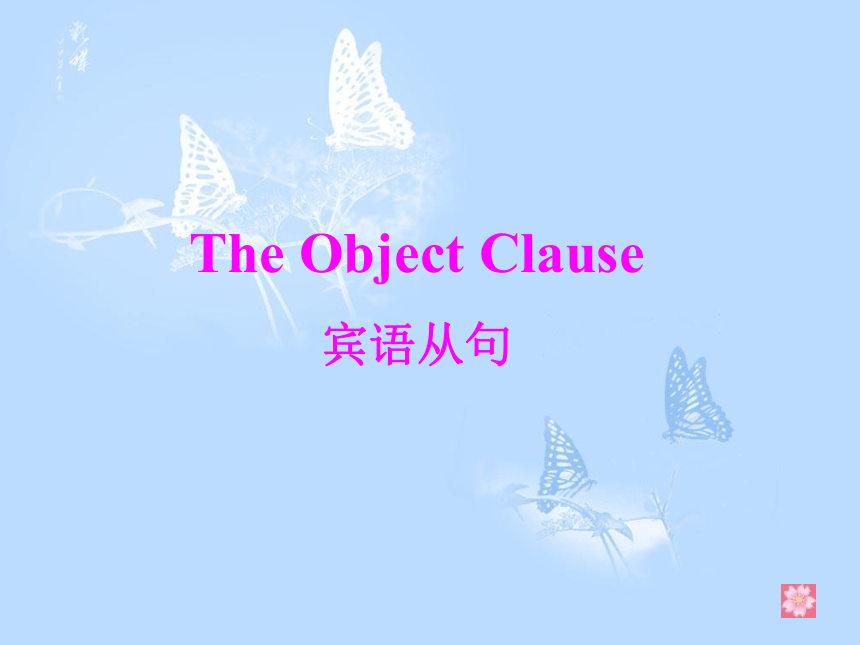 | |
| 格式 | zip | ||
| 文件大小 | 809.7KB | ||
| 资源类型 | 教案 | ||
| 版本资源 | 通用版 | ||
| 科目 | 英语 | ||
| 更新时间 | 2022-12-13 17:37:51 | ||
图片预览

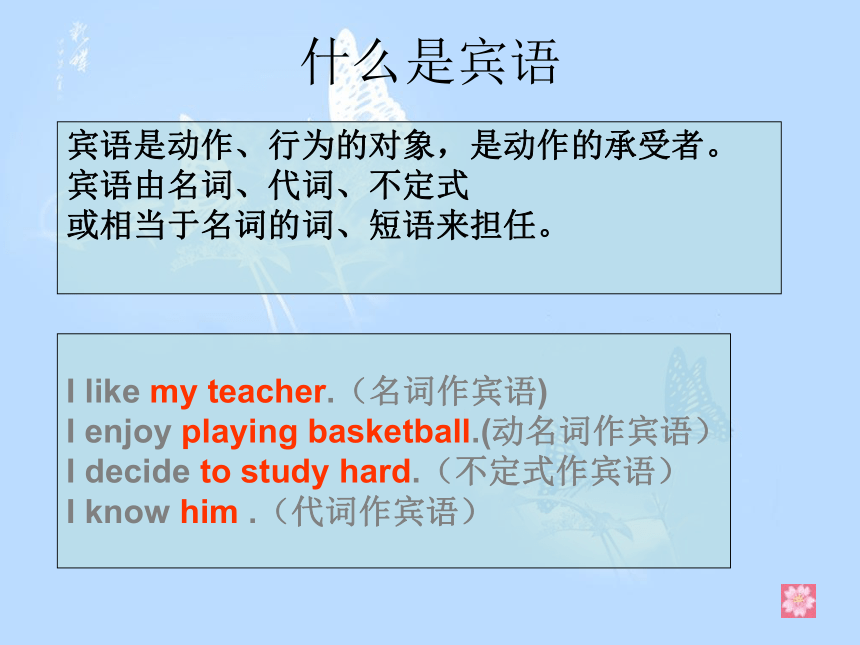
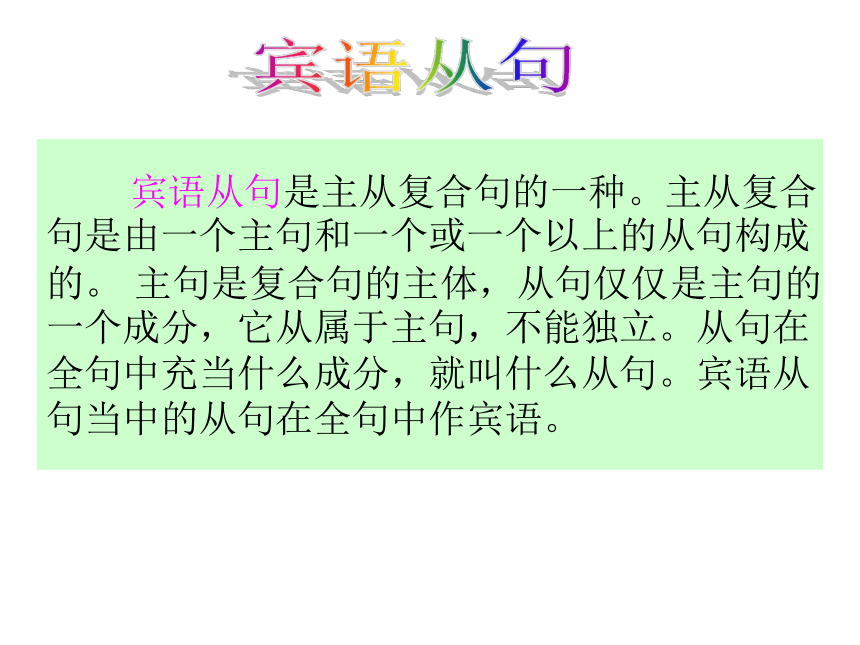
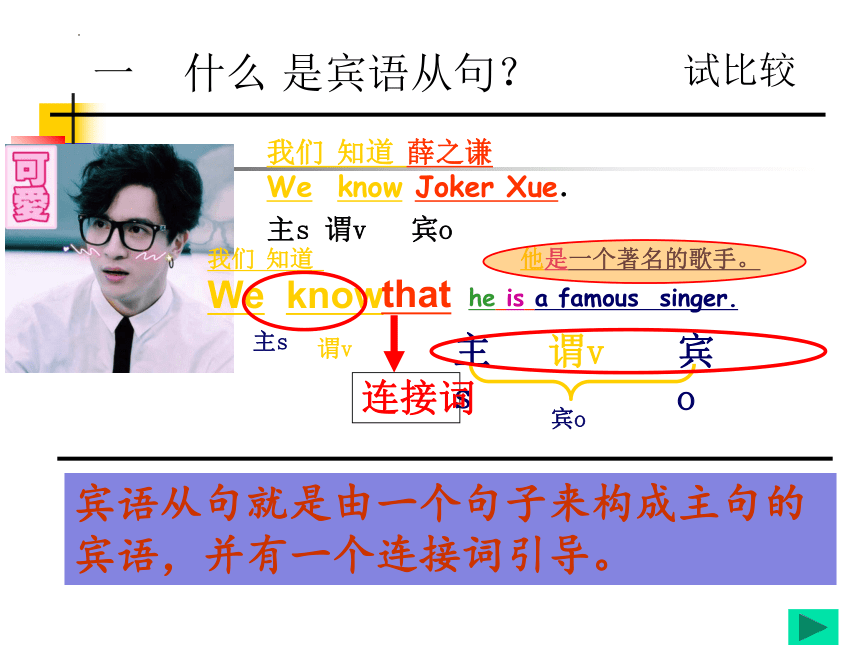
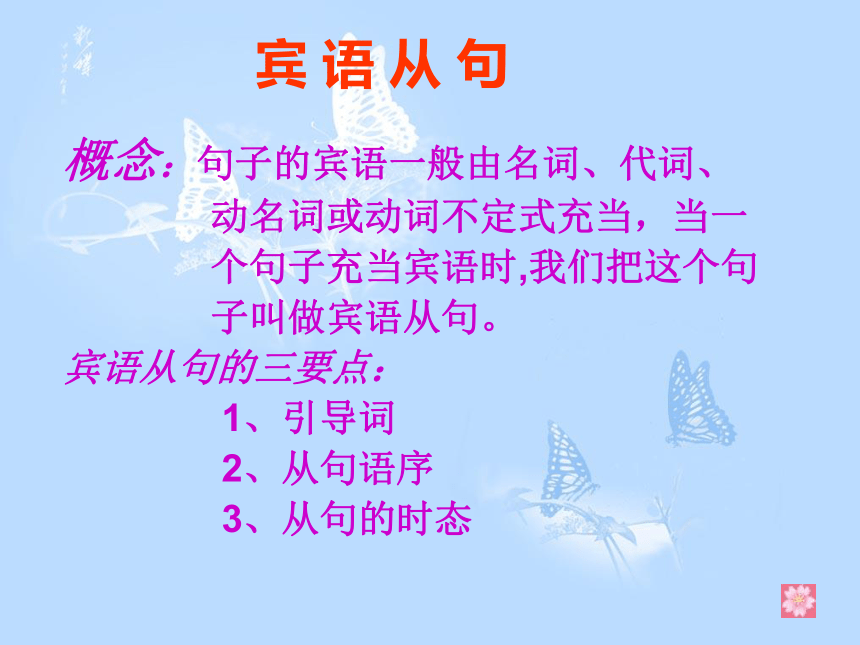
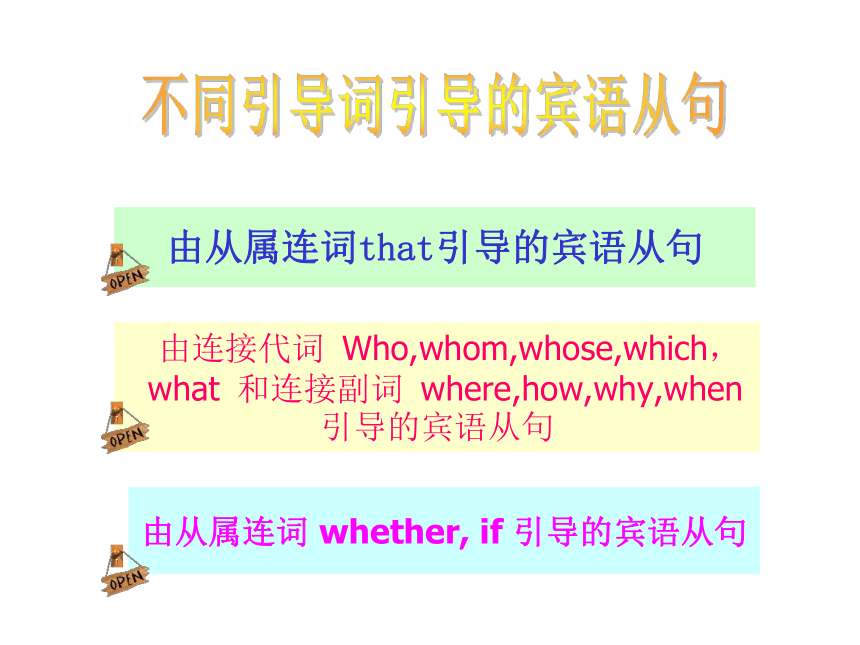
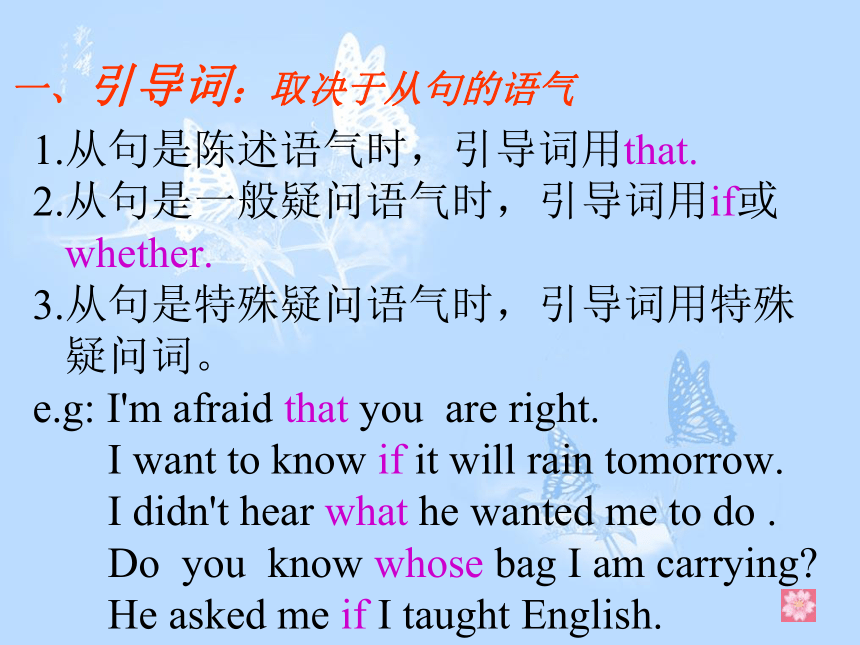
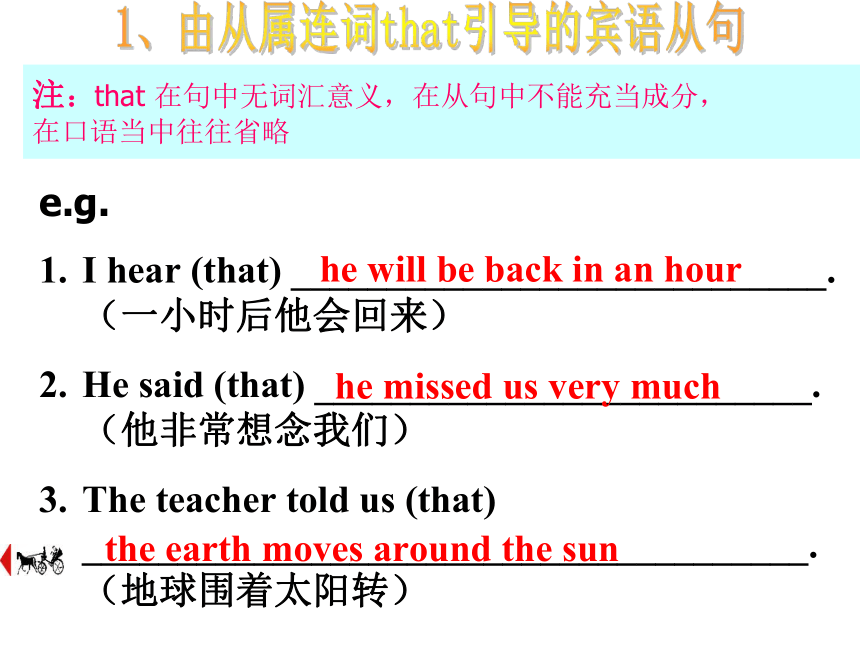
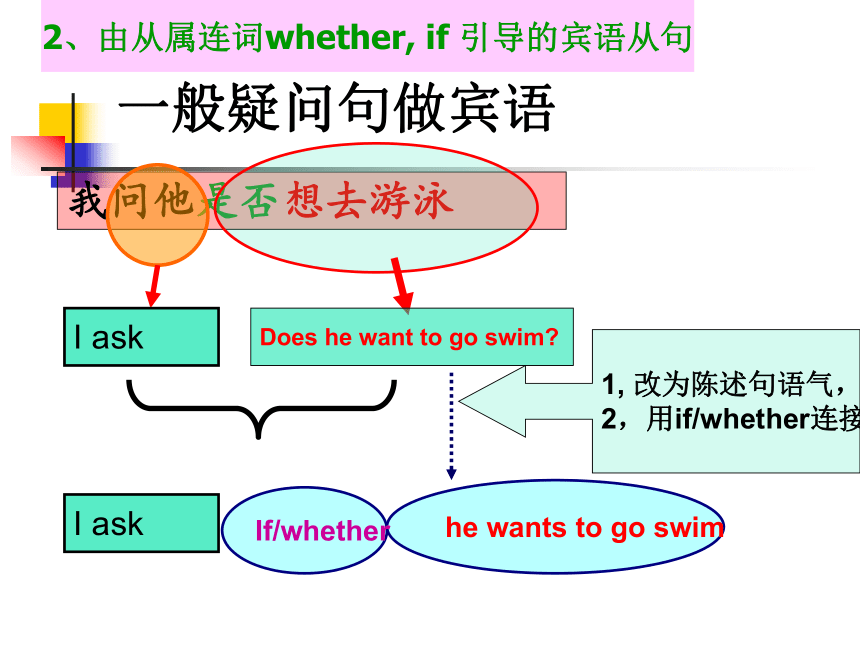
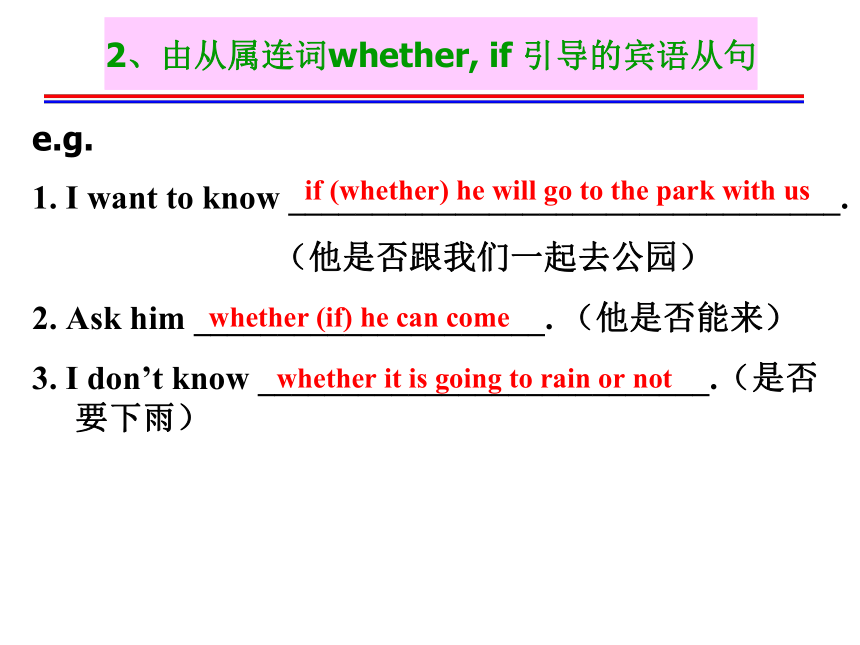
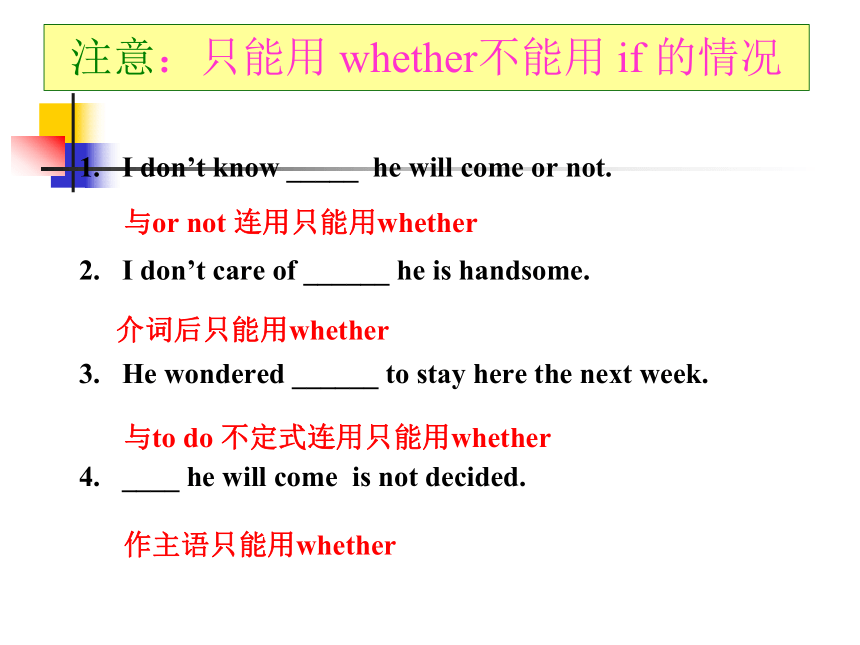
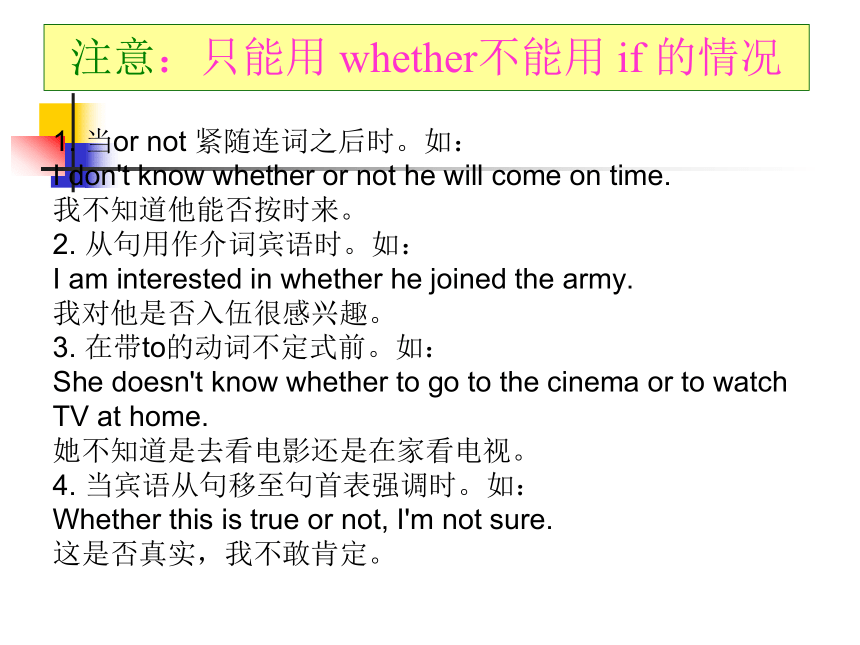
文档简介
(共49张PPT)
The Object Clause
宾语从句
什么是宾语
宾语是动作、行为的对象,是动作的承受者。
宾语由名词、代词、不定式
或相当于名词的词、短语来担任。
I like my teacher.(名词作宾语)
I enjoy playing basketball.(动名词作宾语)
I decide to study hard.(不定式作宾语)
I know him .(代词作宾语)
宾语从句是主从复合句的一种。主从复合
句是由一个主句和一个或一个以上的从句构成
的。 主句是复合句的主体,从句仅仅是主句的
一个成分,它从属于主句,不能独立。从句在
全句中充当什么成分,就叫什么从句。宾语从
句当中的从句在全句中作宾语。
宾语从句
我们 知道 薛之谦
We know Joker Xue.
我们 知道 他是一个著名的歌手。
We know
宾语从句就是由一个句子来构成主句的宾语,并有一个连接词引导。
一 什么 是宾语从句?
试比较
宾o
宾o
主s
谓v
he is a famous singer.
主s
谓v
宾o
that
连接词
谓v
主s
宾 语 从 句
概念:句子的宾语一般由名词、代词、
动名词或动词不定式充当,当一
个句子充当宾语时,我们把这个句
子叫做宾语从句。
宾语从句的三要点:
1、引导词
2、从句语序
3、从句的时态
不同引导词引导的宾语从句
由从属连词that引导的宾语从句
由连接代词 Who,whom,whose,which,
what 和连接副词 where,how,why,when
引导的宾语从句
由从属连词 whether, if 引导的宾语从句
一、引导词:取决于从句的语气
1.从句是陈述语气时,引导词用that.
2.从句是一般疑问语气时,引导词用if或
whether.
3.从句是特殊疑问语气时,引导词用特殊
疑问词。
e.g: I'm afraid that you are right.
I want to know if it will rain tomorrow.
I didn't hear what he wanted me to do .
Do you know whose bag I am carrying
He asked me if I taught English.
1、由从属连词that引导的宾语从句
注:that 在句中无词汇意义,在从句中不能充当成分,
在口语当中往往省略
e.g.
I hear (that) ____________________________. (一小时后他会回来)
He said (that) __________________________. (他非常想念我们)
The teacher told us (that) ______________________________________. (地球围着太阳转)
he will be back in an hour
he missed us very much
the earth moves around the sun
一般疑问句做宾语
我问他是否想去游泳
1, 改为陈述句语气,
2,用if/whether连接
I ask
Does he want to go swim
he wants to go swim
If/whether
I ask
2、由从属连词whether, if 引导的宾语从句
2、由从属连词whether, if 引导的宾语从句
e.g.
1. I want to know _________________________________.
(他是否跟我们一起去公园)
2. Ask him _____________________. (他是否能来)
3. I don’t know ___________________________.(是否要下雨)
if (whether) he will go to the park with us
whether (if) he can come
whether it is going to rain or not
I don’t know _____ he will come or not.
I don’t care of ______ he is handsome.
He wondered ______ to stay here the next week.
____ he will come is not decided.
与or not 连用只能用whether
介词后只能用whether
与to do 不定式连用只能用whether
作主语只能用whether
注意:只能用 whether不能用 if 的情况
注意:只能用 whether不能用 if 的情况
1. 当or not 紧随连词之后时。如:
I don't know whether or not he will come on time.
我不知道他能否按时来。
2. 从句用作介词宾语时。如:
I am interested in whether he joined the army.
我对他是否入伍很感兴趣。
3. 在带to的动词不定式前。如:
She doesn't know whether to go to the cinema or to watch TV at home.
她不知道是去看电影还是在家看电视。
4. 当宾语从句移至句首表强调时。如:
Whether this is true or not, I'm not sure.
这是否真实,我不敢肯定。
Practice time
选择 if / whether。
1. I asked her __________ she had a bike.
2. We’re worried about ________ he is safe.
3. I wonder ___________ he is well.
4. I don’t know ________ or not he is well.
5. I don’t know _______ to go.
if / whether
whether
whether /if
whether
whether
特殊疑问句做宾语
我想知道你最喜欢哪一条领带?
Which tie do you like best
特殊疑问句变成 陈述语序
连接词就是疑问词本身
I wonder
I wonder
ATTENTION
which tie you like best
1. He asked . (谁能回答这个问题)
2. Do you know_________________________. (他们在等谁)
3. He asked ________________________________. (谁的书法是班上最好的)
4. Please tell me _______________________________. (我们什么时候开会)
5. Can you tell me _______________. (他在哪儿)
6. Could you tell me ____________________________. (我该怎么去车站)
9. Would you tell me _________________________(为什么火车迟到了)
who could answer the question
whom they are waiting for
whose handwriting was the best in the class
when we’ll have a meeting
where he is
how I can get to the station
why the train is late
3.由连接代词 Who,whom,whose,which,what和连接副词 where,how,why,when引导的宾语从句。这些连词既有词义又充当句子成份。
who 谁,作主语
whom 谁,作宾语
whose 谁的,作定语
when 什么时候,作时间状语
where 哪里,作地点状语
how 怎么,作方式状语
why 为什么,作原因状语
二、从句语序:一律用陈述语序
主句+引导词+主语+谓语动词+其他
He asked me when I arrived in Shanghai .
I want to know where they will go.
Could you tell me what you are reading
I don't know where he lives .
e.g : Could you tell me how I can get to the Science Museum
He asked him where he came from .
Did you know what’s the name of the handsome boy in the classroom yesterday?
Please tell me where I can buy the beautiful flower .
请注意观察红色字体的语序
三、主.从句的时态呼应
1.主句是一般现在时,从句可以用任何时态。
2.主句是一般过去时,从句用过去范畴的时态。
3.主句是一般过去时,但从句表达的是客观真
理或自然现象时,仍然用一般现在时。
e.g: He says that he is reading a book now.
He said that he would work hard.
They said they had been to France.
The students asked me if the earth goes round the sun.
宾语从句中时态的变化
I hear (that)
Jim ( be ) a worker two years ago.
Jim ( be ) an English teacher now .
Jim ( cook ) dinner tomorrow .
Jim ( sing )a popular song now.
Jim ( be ) to the Great Wall twice . Jim ( play ) basketball when his father came back.
Jim ( learn )1000 Chinese words by the end of last semester.
填一填
was
is
will cook
is singing
has been
was playing
had learned
1.当主句是一般现在时,宾语从句的时态不作限制,我们可以根据句子的需要使用任何一种时态。
(需要性原则)
2.当主句是一般过去时的时候,宾语从句必须运用相应的过去的某一种时态,从而达到主句和从句的相互一致。
e.g
He said ( that ) he would go to Xi’an .
He said ( that ) he was ill yesterday .
He said ( that ) he was reading a book .
He said ( that ) he had had supper already .
3.当宾语从句说明的是客观存在的事实或者是客观存在的真理时,就不用受到主句时态的限制,仍是用一般现在时态。
e.g
He said that the sun is much bigger than the moon .
The teacher told the students that light travels faster than sound.
The PE teacher said that doing morning exercise is useful to our health .
确定从句的时态(根据主句时态)
主句时态
从 句 时 态
连 接 前
连 接 后
一般现在时
时态保持不变
一般过去时
一般现在时
一般过去时
一般过去时
过去完成时
一般将来时
过去将来时
现在进行时
过去进行时
现在完成时
过去完成时
标点符号 :
宾语从句末尾的标点符号由主句决定,不受从句的限制。如果主句是陈述句或者是祈使句时用句号;而主句是疑问句时,句末则用问号。
e.g
He asked me if / whether I could help him .
Do you know where Li Ping is
Please tell me which colour you like best .
Would you please tell the teacher how old you are
四、宾语从句的标点符号
五、宾语从句的否定形式 :
一般而言,宾语从句的否定式与一般句子的否定式是一样的。但若主句谓语动词是 think 、 expect 、 believe 、 guess 、 imagine 、 suppose 等表示“认为,猜想”的词时,一般要把宾语从句中的否定式转移到主句中。
e.g
I don’t think it’s going to rain . I don’t believe she will lend you the money .
但是,如果主句中的谓语动词是 hope ,则不适用于此规则。
e.g
I hope he won’t come .
宾语从句三要素
引导词
that(陈述句 )
if/whether(一般疑问句 )
特殊疑问词(特殊疑问句)
时态
主句为一般现在时从句可为任何时态
主句为一般过去时
从句
一般过去时
过去将来时
过去进行时
过去完成时
语序
宾语从句的语序都为陈述句语序
客观真理 自然现象
公式定理 名言警句 时态不变
本课小结
1.Do you know __________________
A. where does she live B. she lives where
C. where she lives D. where she live
2. His parents wanted to know what he ______at that time.
A. is doing B. was doing C. has done D. will do
C
B
巩固练习:
I.从下列A、B、C、D中选择一个正确选项填空。
4.Lily’s mother looked for her for half an hour, but could not find ________
what Lily was B. what was Lily
C. where Lily was D. where was Lily
C
3.—We don’t know ______.
-- It is said that he was born in Canada.
what he is B. when he was born
C. where he comes from D. if he lives here
C
5 The girls asked if they ____ some food and drink with them.
A. took B. take C. takes D. will take
6 Linda said the moon___ round the earth.
A. travelled B. has travelled C. travels D. had travelled
A
C
7. Could you please tell me ________ he will come here tomorrow
A. if B. weather C. what D. which
A
8. Could you tell me ___
A. when will they leave Beijing
B. when would they leave Beijing
C. when they will leave Beijing
D. when did they leave Beijing
C
六、宾语从句与直接引语变间接引语的关系。
直接引语变为间接引语之后通常都构成一个宾语从句。因此我们要掌握好宾语从句的用法必须也要熟悉直接引语变间接引语的规则。
Direct Speech and Indirect Speech
引语的概念
直接引述别人的原话,叫 ____________;
直接引语
用自己的话把别人的话陈述出来,叫 _________。
间接引语
直接引语通常都用____________括起来,
引号“ ”
间接引语在多数情况下都构成一个 ________。
宾语从句
Direct Speech
Indirect Speech
She said, “I like singing. ”
She said, “I am waiting for a bus.”
She said, “I visited Europe last year.”
She said, “I have never met an American.”
She said, “I will see you next week.”
She said that she liked singing.
She said that she was waiting for a bus.
She said she had visited Europe the year before.
She said she had never met an American.
She said that she would see me the next week.
SUMMARY
直接引语是陈述句,变为间接引语时用连词that(可省略)引导宾语从句.从句中的人称、时态、指示代词、时间状语、地点状语 等相应变化.
1、人称的变化
口诀 说 明 直接引语 间接引语
一
随
主
二随宾
第三
人称
不变
引号内的第一人
称变间引后与主
句主语的人称保
持一致
引号内的第二人
称变间引后与主
句宾语的人称保
持一致
引号内的第三人
称在变间引后人
称不变
She said,“ I like
Tennis.”
She said that she
liked tennis.
He said to Lily,
“ you must get
up early.”
He told Lily that
she must get up
early.
She said to me ,
“ They want to
help him.”
She told me that
they wanted to
help him.
一随主,二随宾,第三人称不更新
直接引语
间接引语
一般现在时
一般过去时
现在进行时
过去进行时
一般过去时
过去完成时
现在完成时
过去完成时
一般将来时
过去将来时
The teacher said,“The sun is bigger than the earth.”
The teacher said that the sun is bigger than the earth.
注: 直引若是客观真理,变为间引时,时态不变.
时态变化
2
直接引语
间接引语
指示代词
时 间 状 语
地点状语
方向性动词
this,
that,
these
those
now,
then,
today
that day
this week
that week
yesterday
the day before
last week
the week before
four days ago
four days before
the day before yesterday
two days before
tomorrow
the next/following day
next month
the next/following month
here
there
come,
go,
bring
take
情态动词
can, may, must
could,might,had to
Direct Speech
Indirect Speech
She asked, “Have you seen the film ”
She asked me whether\if I had seen the film.
He asked, “Are you a doctor, John ”
He asked John if\whether he was a doctor.
She asked us, “Where are you going to get off ”
She asked us where we were going to get off.
He asked them, “Who gave you a talk yesterday ”
He asked them who had given them a talk the day before.
SUMMARY
直接引语是疑问句,变间接引语时,要把疑问语序变为陈述语序。
直接引语是一般疑问句,变为间接引语时,用连词 if 或 whether 连接。
直接引语是特殊疑问句,变为间接引语时,仍用原来的疑问词作连词来引导。
Direct Speech
Indirect Speech
“Never do that again,” the teacher said.
The policeman ordered us to be quiet.
The policeman ordered:“Be quiet.”
The teacher told the boy to open the window .
The teacher said to the boy ,”Open the window .”
The teacher told me not /never to do that again.
“Wait a moment.” she said to them.
She asked them to wait a moment .
直接引语是祈使句,变成间接引语,把动词原形变成动词不定式,并在动词不定前加tell, ask, order , advise等动词的宾语。
注意:否定句,在动词不定式前加not或never.
SUMMARY
解题步骤:
1.陈述句
“I don’t like computers,” Sandy said to her friends.
Sandy said to her friends
that
I don’t like
computers.
said/told
didn’t
she
Sandy said to/told her friends that she didn’t like computers.
2.一般疑问句:
Is it easy to work out the problem
( They asked him )
They asked him
if
It is easy to work out the problem.
it is easy to work out the problem.
asked
is
was
They asked him if it was easy to work out the problem.
3.特殊疑问句:
When do you harvest the wheat
( They asked him )
They asked him
when
you harvest the wheat
you harvest the wheat.
he
harvested
They asked him when he harvested the wheat.
4.祈使句
Little boy, put on your coat.
(They ordered )
They ordered
Little boy
Little boy, put on your coat.
put on your coat.
to put
They ordered the little boy to put on his coat.
his
The radio says it _________ cloudy tomorrow. (be)
The headmaster hopes everything ______ well. (go)
Tom says that they ________________ (play) basketball at six o’clock yesterday evening.
I hear they _____________ (return) it already.
He said that they _____________ members of the Party since 1948. (be)
will be
goes
were playing
has returned
had been
He asked what they _______________ at eight last night. (do)
The teacher told his class that light _______ faster than sound. (travel)
I think you _____________ about the relay race now. (talk)
I didn’t know whom the letters _________ from. (be)
travels
are talking
were
were doing
10. I didn’t know what time he _______ the letter.
(write)
11. Miss Wang told me that the earth __________(move)
round the earth.
12. Could you tell me who ____________ away the book
already (take)
13. Ling Feng told me he _________ to several times. (be)
14. Our teacher told us in class the sun _______ in the
east. (rise)
15. Can you tell me what they ______ yesterday (do)
wrote
moves
has taken
had been
rises
did
将下列句子合并为一句:
1. Where do they stop on the way I asked.
2. What will you speak at the meeting Could you tell me
3. Do they like to make friends with us He asked.
4. “ I am doing my homework.” He said.
I asked where they stopped on the way.
Could you tell me what you will speak at the meeting
He asked if they liked to make friends with them.
He said that he was doing his homework.
将下列句子合并为一句:
5. “I will come back.” Tom said.
6. “Is he doing his homework ” Jim asked.
7. “When will he come back ” Tom asked.
Tom said that he would come back.
Jim asked if he was doing his homework.
Tom asked when he would come back.
8. “How can I get to the station ”
Could you tell me
9. “Why is the train late ” Would you tell me
10. “Where is Tom ” They asked.
Could you tell me how I can get to the station
Would you tell me why the train is late
They asked where Tom was.
The Object Clause
宾语从句
什么是宾语
宾语是动作、行为的对象,是动作的承受者。
宾语由名词、代词、不定式
或相当于名词的词、短语来担任。
I like my teacher.(名词作宾语)
I enjoy playing basketball.(动名词作宾语)
I decide to study hard.(不定式作宾语)
I know him .(代词作宾语)
宾语从句是主从复合句的一种。主从复合
句是由一个主句和一个或一个以上的从句构成
的。 主句是复合句的主体,从句仅仅是主句的
一个成分,它从属于主句,不能独立。从句在
全句中充当什么成分,就叫什么从句。宾语从
句当中的从句在全句中作宾语。
宾语从句
我们 知道 薛之谦
We know Joker Xue.
我们 知道 他是一个著名的歌手。
We know
宾语从句就是由一个句子来构成主句的宾语,并有一个连接词引导。
一 什么 是宾语从句?
试比较
宾o
宾o
主s
谓v
he is a famous singer.
主s
谓v
宾o
that
连接词
谓v
主s
宾 语 从 句
概念:句子的宾语一般由名词、代词、
动名词或动词不定式充当,当一
个句子充当宾语时,我们把这个句
子叫做宾语从句。
宾语从句的三要点:
1、引导词
2、从句语序
3、从句的时态
不同引导词引导的宾语从句
由从属连词that引导的宾语从句
由连接代词 Who,whom,whose,which,
what 和连接副词 where,how,why,when
引导的宾语从句
由从属连词 whether, if 引导的宾语从句
一、引导词:取决于从句的语气
1.从句是陈述语气时,引导词用that.
2.从句是一般疑问语气时,引导词用if或
whether.
3.从句是特殊疑问语气时,引导词用特殊
疑问词。
e.g: I'm afraid that you are right.
I want to know if it will rain tomorrow.
I didn't hear what he wanted me to do .
Do you know whose bag I am carrying
He asked me if I taught English.
1、由从属连词that引导的宾语从句
注:that 在句中无词汇意义,在从句中不能充当成分,
在口语当中往往省略
e.g.
I hear (that) ____________________________. (一小时后他会回来)
He said (that) __________________________. (他非常想念我们)
The teacher told us (that) ______________________________________. (地球围着太阳转)
he will be back in an hour
he missed us very much
the earth moves around the sun
一般疑问句做宾语
我问他是否想去游泳
1, 改为陈述句语气,
2,用if/whether连接
I ask
Does he want to go swim
he wants to go swim
If/whether
I ask
2、由从属连词whether, if 引导的宾语从句
2、由从属连词whether, if 引导的宾语从句
e.g.
1. I want to know _________________________________.
(他是否跟我们一起去公园)
2. Ask him _____________________. (他是否能来)
3. I don’t know ___________________________.(是否要下雨)
if (whether) he will go to the park with us
whether (if) he can come
whether it is going to rain or not
I don’t know _____ he will come or not.
I don’t care of ______ he is handsome.
He wondered ______ to stay here the next week.
____ he will come is not decided.
与or not 连用只能用whether
介词后只能用whether
与to do 不定式连用只能用whether
作主语只能用whether
注意:只能用 whether不能用 if 的情况
注意:只能用 whether不能用 if 的情况
1. 当or not 紧随连词之后时。如:
I don't know whether or not he will come on time.
我不知道他能否按时来。
2. 从句用作介词宾语时。如:
I am interested in whether he joined the army.
我对他是否入伍很感兴趣。
3. 在带to的动词不定式前。如:
She doesn't know whether to go to the cinema or to watch TV at home.
她不知道是去看电影还是在家看电视。
4. 当宾语从句移至句首表强调时。如:
Whether this is true or not, I'm not sure.
这是否真实,我不敢肯定。
Practice time
选择 if / whether。
1. I asked her __________ she had a bike.
2. We’re worried about ________ he is safe.
3. I wonder ___________ he is well.
4. I don’t know ________ or not he is well.
5. I don’t know _______ to go.
if / whether
whether
whether /if
whether
whether
特殊疑问句做宾语
我想知道你最喜欢哪一条领带?
Which tie do you like best
特殊疑问句变成 陈述语序
连接词就是疑问词本身
I wonder
I wonder
ATTENTION
which tie you like best
1. He asked . (谁能回答这个问题)
2. Do you know_________________________. (他们在等谁)
3. He asked ________________________________. (谁的书法是班上最好的)
4. Please tell me _______________________________. (我们什么时候开会)
5. Can you tell me _______________. (他在哪儿)
6. Could you tell me ____________________________. (我该怎么去车站)
9. Would you tell me _________________________(为什么火车迟到了)
who could answer the question
whom they are waiting for
whose handwriting was the best in the class
when we’ll have a meeting
where he is
how I can get to the station
why the train is late
3.由连接代词 Who,whom,whose,which,what和连接副词 where,how,why,when引导的宾语从句。这些连词既有词义又充当句子成份。
who 谁,作主语
whom 谁,作宾语
whose 谁的,作定语
when 什么时候,作时间状语
where 哪里,作地点状语
how 怎么,作方式状语
why 为什么,作原因状语
二、从句语序:一律用陈述语序
主句+引导词+主语+谓语动词+其他
He asked me when I arrived in Shanghai .
I want to know where they will go.
Could you tell me what you are reading
I don't know where he lives .
e.g : Could you tell me how I can get to the Science Museum
He asked him where he came from .
Did you know what’s the name of the handsome boy in the classroom yesterday?
Please tell me where I can buy the beautiful flower .
请注意观察红色字体的语序
三、主.从句的时态呼应
1.主句是一般现在时,从句可以用任何时态。
2.主句是一般过去时,从句用过去范畴的时态。
3.主句是一般过去时,但从句表达的是客观真
理或自然现象时,仍然用一般现在时。
e.g: He says that he is reading a book now.
He said that he would work hard.
They said they had been to France.
The students asked me if the earth goes round the sun.
宾语从句中时态的变化
I hear (that)
Jim ( be ) a worker two years ago.
Jim ( be ) an English teacher now .
Jim ( cook ) dinner tomorrow .
Jim ( sing )a popular song now.
Jim ( be ) to the Great Wall twice . Jim ( play ) basketball when his father came back.
Jim ( learn )1000 Chinese words by the end of last semester.
填一填
was
is
will cook
is singing
has been
was playing
had learned
1.当主句是一般现在时,宾语从句的时态不作限制,我们可以根据句子的需要使用任何一种时态。
(需要性原则)
2.当主句是一般过去时的时候,宾语从句必须运用相应的过去的某一种时态,从而达到主句和从句的相互一致。
e.g
He said ( that ) he would go to Xi’an .
He said ( that ) he was ill yesterday .
He said ( that ) he was reading a book .
He said ( that ) he had had supper already .
3.当宾语从句说明的是客观存在的事实或者是客观存在的真理时,就不用受到主句时态的限制,仍是用一般现在时态。
e.g
He said that the sun is much bigger than the moon .
The teacher told the students that light travels faster than sound.
The PE teacher said that doing morning exercise is useful to our health .
确定从句的时态(根据主句时态)
主句时态
从 句 时 态
连 接 前
连 接 后
一般现在时
时态保持不变
一般过去时
一般现在时
一般过去时
一般过去时
过去完成时
一般将来时
过去将来时
现在进行时
过去进行时
现在完成时
过去完成时
标点符号 :
宾语从句末尾的标点符号由主句决定,不受从句的限制。如果主句是陈述句或者是祈使句时用句号;而主句是疑问句时,句末则用问号。
e.g
He asked me if / whether I could help him .
Do you know where Li Ping is
Please tell me which colour you like best .
Would you please tell the teacher how old you are
四、宾语从句的标点符号
五、宾语从句的否定形式 :
一般而言,宾语从句的否定式与一般句子的否定式是一样的。但若主句谓语动词是 think 、 expect 、 believe 、 guess 、 imagine 、 suppose 等表示“认为,猜想”的词时,一般要把宾语从句中的否定式转移到主句中。
e.g
I don’t think it’s going to rain . I don’t believe she will lend you the money .
但是,如果主句中的谓语动词是 hope ,则不适用于此规则。
e.g
I hope he won’t come .
宾语从句三要素
引导词
that(陈述句 )
if/whether(一般疑问句 )
特殊疑问词(特殊疑问句)
时态
主句为一般现在时从句可为任何时态
主句为一般过去时
从句
一般过去时
过去将来时
过去进行时
过去完成时
语序
宾语从句的语序都为陈述句语序
客观真理 自然现象
公式定理 名言警句 时态不变
本课小结
1.Do you know __________________
A. where does she live B. she lives where
C. where she lives D. where she live
2. His parents wanted to know what he ______at that time.
A. is doing B. was doing C. has done D. will do
C
B
巩固练习:
I.从下列A、B、C、D中选择一个正确选项填空。
4.Lily’s mother looked for her for half an hour, but could not find ________
what Lily was B. what was Lily
C. where Lily was D. where was Lily
C
3.—We don’t know ______.
-- It is said that he was born in Canada.
what he is B. when he was born
C. where he comes from D. if he lives here
C
5 The girls asked if they ____ some food and drink with them.
A. took B. take C. takes D. will take
6 Linda said the moon___ round the earth.
A. travelled B. has travelled C. travels D. had travelled
A
C
7. Could you please tell me ________ he will come here tomorrow
A. if B. weather C. what D. which
A
8. Could you tell me ___
A. when will they leave Beijing
B. when would they leave Beijing
C. when they will leave Beijing
D. when did they leave Beijing
C
六、宾语从句与直接引语变间接引语的关系。
直接引语变为间接引语之后通常都构成一个宾语从句。因此我们要掌握好宾语从句的用法必须也要熟悉直接引语变间接引语的规则。
Direct Speech and Indirect Speech
引语的概念
直接引述别人的原话,叫 ____________;
直接引语
用自己的话把别人的话陈述出来,叫 _________。
间接引语
直接引语通常都用____________括起来,
引号“ ”
间接引语在多数情况下都构成一个 ________。
宾语从句
Direct Speech
Indirect Speech
She said, “I like singing. ”
She said, “I am waiting for a bus.”
She said, “I visited Europe last year.”
She said, “I have never met an American.”
She said, “I will see you next week.”
She said that she liked singing.
She said that she was waiting for a bus.
She said she had visited Europe the year before.
She said she had never met an American.
She said that she would see me the next week.
SUMMARY
直接引语是陈述句,变为间接引语时用连词that(可省略)引导宾语从句.从句中的人称、时态、指示代词、时间状语、地点状语 等相应变化.
1、人称的变化
口诀 说 明 直接引语 间接引语
一
随
主
二随宾
第三
人称
不变
引号内的第一人
称变间引后与主
句主语的人称保
持一致
引号内的第二人
称变间引后与主
句宾语的人称保
持一致
引号内的第三人
称在变间引后人
称不变
She said,“ I like
Tennis.”
She said that she
liked tennis.
He said to Lily,
“ you must get
up early.”
He told Lily that
she must get up
early.
She said to me ,
“ They want to
help him.”
She told me that
they wanted to
help him.
一随主,二随宾,第三人称不更新
直接引语
间接引语
一般现在时
一般过去时
现在进行时
过去进行时
一般过去时
过去完成时
现在完成时
过去完成时
一般将来时
过去将来时
The teacher said,“The sun is bigger than the earth.”
The teacher said that the sun is bigger than the earth.
注: 直引若是客观真理,变为间引时,时态不变.
时态变化
2
直接引语
间接引语
指示代词
时 间 状 语
地点状语
方向性动词
this,
that,
these
those
now,
then,
today
that day
this week
that week
yesterday
the day before
last week
the week before
four days ago
four days before
the day before yesterday
two days before
tomorrow
the next/following day
next month
the next/following month
here
there
come,
go,
bring
take
情态动词
can, may, must
could,might,had to
Direct Speech
Indirect Speech
She asked, “Have you seen the film ”
She asked me whether\if I had seen the film.
He asked, “Are you a doctor, John ”
He asked John if\whether he was a doctor.
She asked us, “Where are you going to get off ”
She asked us where we were going to get off.
He asked them, “Who gave you a talk yesterday ”
He asked them who had given them a talk the day before.
SUMMARY
直接引语是疑问句,变间接引语时,要把疑问语序变为陈述语序。
直接引语是一般疑问句,变为间接引语时,用连词 if 或 whether 连接。
直接引语是特殊疑问句,变为间接引语时,仍用原来的疑问词作连词来引导。
Direct Speech
Indirect Speech
“Never do that again,” the teacher said.
The policeman ordered us to be quiet.
The policeman ordered:“Be quiet.”
The teacher told the boy to open the window .
The teacher said to the boy ,”Open the window .”
The teacher told me not /never to do that again.
“Wait a moment.” she said to them.
She asked them to wait a moment .
直接引语是祈使句,变成间接引语,把动词原形变成动词不定式,并在动词不定前加tell, ask, order , advise等动词的宾语。
注意:否定句,在动词不定式前加not或never.
SUMMARY
解题步骤:
1.陈述句
“I don’t like computers,” Sandy said to her friends.
Sandy said to her friends
that
I don’t like
computers.
said/told
didn’t
she
Sandy said to/told her friends that she didn’t like computers.
2.一般疑问句:
Is it easy to work out the problem
( They asked him )
They asked him
if
It is easy to work out the problem.
it is easy to work out the problem.
asked
is
was
They asked him if it was easy to work out the problem.
3.特殊疑问句:
When do you harvest the wheat
( They asked him )
They asked him
when
you harvest the wheat
you harvest the wheat.
he
harvested
They asked him when he harvested the wheat.
4.祈使句
Little boy, put on your coat.
(They ordered )
They ordered
Little boy
Little boy, put on your coat.
put on your coat.
to put
They ordered the little boy to put on his coat.
his
The radio says it _________ cloudy tomorrow. (be)
The headmaster hopes everything ______ well. (go)
Tom says that they ________________ (play) basketball at six o’clock yesterday evening.
I hear they _____________ (return) it already.
He said that they _____________ members of the Party since 1948. (be)
will be
goes
were playing
has returned
had been
He asked what they _______________ at eight last night. (do)
The teacher told his class that light _______ faster than sound. (travel)
I think you _____________ about the relay race now. (talk)
I didn’t know whom the letters _________ from. (be)
travels
are talking
were
were doing
10. I didn’t know what time he _______ the letter.
(write)
11. Miss Wang told me that the earth __________(move)
round the earth.
12. Could you tell me who ____________ away the book
already (take)
13. Ling Feng told me he _________ to several times. (be)
14. Our teacher told us in class the sun _______ in the
east. (rise)
15. Can you tell me what they ______ yesterday (do)
wrote
moves
has taken
had been
rises
did
将下列句子合并为一句:
1. Where do they stop on the way I asked.
2. What will you speak at the meeting Could you tell me
3. Do they like to make friends with us He asked.
4. “ I am doing my homework.” He said.
I asked where they stopped on the way.
Could you tell me what you will speak at the meeting
He asked if they liked to make friends with them.
He said that he was doing his homework.
将下列句子合并为一句:
5. “I will come back.” Tom said.
6. “Is he doing his homework ” Jim asked.
7. “When will he come back ” Tom asked.
Tom said that he would come back.
Jim asked if he was doing his homework.
Tom asked when he would come back.
8. “How can I get to the station ”
Could you tell me
9. “Why is the train late ” Would you tell me
10. “Where is Tom ” They asked.
Could you tell me how I can get to the station
Would you tell me why the train is late
They asked where Tom was.
